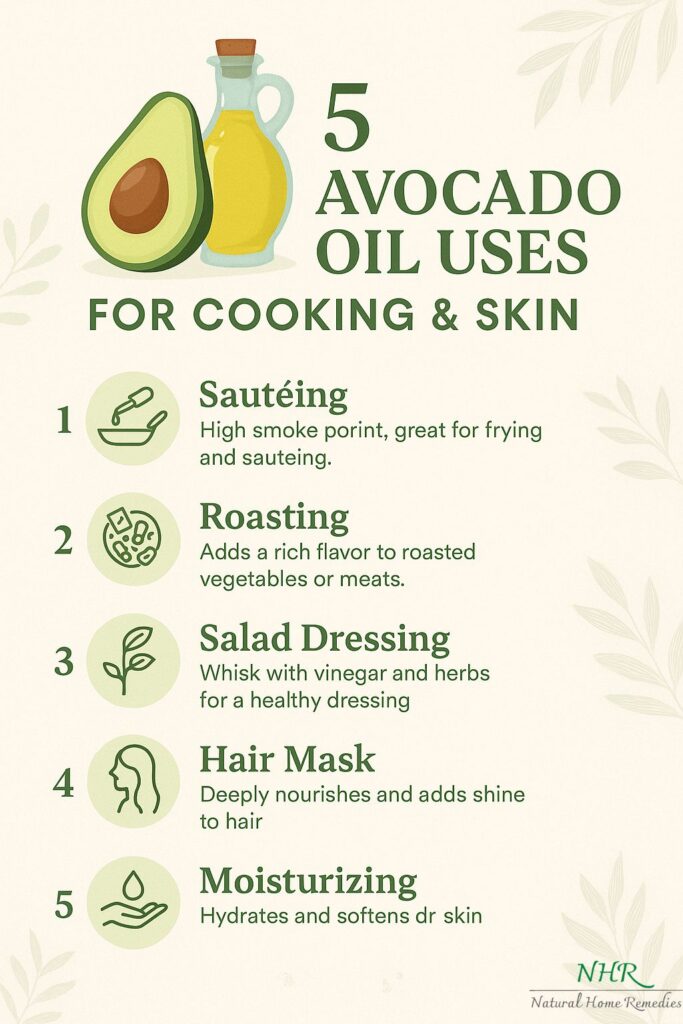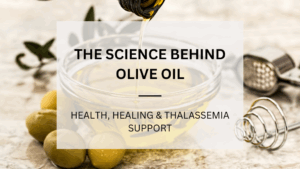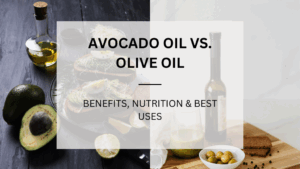Avocado oil is gaining attention as a top choice for health-conscious cooks, thanks to its rich nutrient profile and versatility in the kitchen. Extracted from the creamy flesh of avocados, this oil offers a high smoke point, heart-healthy fats, and potential benefits for conditions like thalassemia major. In this article, we’ll explore why avocado oil might be one of the healthiest cooking oils, focusing on its benefits for cooking, heart health, and beyond, backed by science.
Unlock the power of avocado oil with practical tips and recipes. Dive deeper into healthy oils with our Ultimate Guide to Healthy Oils, or compare with Benefits of Olive Oil for Heart, Skin & Brain Health and Coconut Oil Benefits: Uses for Cooking, Skin, and Energy.
What Makes Avocado Oil Stand Out?
Avocado oil’s unique composition sets it apart from other oils:
- Monounsaturated Fats (MUFAs): About 70% of their fat content is oleic acid, a heart-healthy MUFA (Molecules, 2019).
- High Smoke Point: Refined avocado oil reaches 520°F, ideal for high-heat cooking, while unrefined is 480°F.
- Antioxidants: Contains lutein and vitamin E, which combat oxidative stress (Food Chemistry, 2014).
- Types:
- Unrefined Avocado Oil: Cold-pressed, retains nutrients and a buttery flavor.
- Refined Avocado Oil: Processed for a neutral taste and higher smoke point.
How to Choose Quality Avocado Oil:
- Opt for cold-pressed or unrefined for maximum nutrients.
- Look for USDA Organic or Non-GMO Project Verified labels.
- Choose dark glass bottles to protect from light.
- Recommended Brand: Chosen Foods 100% Pure Avocado Oil.
| Feature | Unrefined Avocado Oil | Refined Avocado Oil |
|---|---|---|
| Extraction Method | Cold-pressed from fresh avocado pulp; minimal processing | Filtered and processed (including bleaching and deodorizing) |
| Smoke Point | ~480°F (249°C) | ~520°F (271°C) |
| Flavor Profile | Mild, buttery, slightly grassy, or nutty | Neutral, clean taste |
| Color | Deep green (rich in chlorophyll and carotenoids) | Light yellow |
| Nutrient Content | Retains most nutrients — high in lutein, vitamin E, and polyphenols | Some nutrients (esp. antioxidants) are lost during processing |
| Fat Composition | ~70% monounsaturated fats (oleic acid), ~12% saturated, ~13% polyunsaturated | Similar fat profile, but heat-sensitive nutrients may degrade |
| Oxidative Stability | Moderately stable; more prone to oxidation if stored improperly | Highly stable due to reduced impurities and lower moisture |
| Best Culinary Uses | Salad dressings, dips, sautéing, and low to medium-heat cooking | Frying, roasting, grilling, stir-frying — all high-heat applications |
| Non-Culinary Uses | Excellent for skin and hair care due to intact nutrients | Less effective topically due to loss of antioxidants |
| Shelf Life | ~6–12 months (requires dark bottle and cool storage) | ~12–18 months (longer shelf life due to refinement) |
| Processing Impact | Minimal impact; maintains original flavor and nutrients | Reduces flavor, aroma, and antioxidant content |
| Environmental Impact | Often sustainably sourced, with lower energy use in cold-pressed extraction | May have a higher processing footprint |
| Price Range | Higher, due to minimal processing and quality sourcing | Slightly lower — mass production and refinement reduce cost |
| Ideal For | Health-focused consumers who want flavor and nutrition | Everyday cooking, especially at high heat, where stability is key |
Avocado Oil Benefits for Cooking
Avocado oil shines in the kitchen due to its versatility:
- High Smoke Point: At 520°F for refined oil, it’s perfect for frying, grilling, and roasting without breaking down into harmful compounds.
- Flavor Profile: Unrefined offers a mild, buttery taste; refined is neutral, suiting any dish.
- Study Highlight: A 2019 study confirmed that avocado oil remains stable at high heat, producing fewer harmful compounds than other oils (Journal of Food Science, 2019).
- Practical Tip: Use 2 tbsp of avocado oil to roast vegetables at 425°F for a crispy finish.
Related: Coconut Oil Benefits: Uses for Cooking, Skin, and Energy
Benefits of Avocado Oil for Heart Health
Avocado oil supports cardiovascular wellness:
- Cholesterol Management: Oleic acid may lower LDL (“bad”) cholesterol while maintaining HDL (“good”) levels.
- Anti-Inflammatory: Its antioxidants reduce inflammation, a key factor in heart disease.
- Study Highlight: A 2015 study showed replacing saturated fats with MUFAs like oleic acid improved lipid profiles (Journal of the American Heart Association, 2015).
- Practical Tip: Drizzle 1 tbsp on salads for a heart-healthy dressing.
Related: Benefits of Olive Oil for Heart, Skin & Brain Health
Thalassemia Support with Avocado Oil
Thalassemia major, a genetic blood disorder, often leads to iron overload from transfusions, causing oxidative stress. Avocado oil may offer supportive benefits:
- Antioxidant Power: Lutein and vitamin E in avocado oil help neutralize free radicals, potentially easing oxidative damage.
- Anti-Inflammatory Effects: Oleic acid may reduce inflammation linked to thalassemia complications.
- Study Highlight: A 2018 study suggested that oils rich in antioxidants, like avocado oil, could mitigate oxidative stress in iron-overload conditions (Redox Biology, 2018).
- Practical Tip: Add 1 tsp to smoothies, but consult your doctor to align with your treatment plan.
I haven’t started using avocado oil yet, as I still prefer olive oil. I’ve been using it for several years, and I feel it has contributed positively to my overall health, being a Thalassemia Major. That said, it’s hard to say if it’s the only reason. My advice? Try different healthy oils and see which one suits your body and lifestyle the best.
Additional Benefits: Skin and Hair Health
Beyond cooking and heart health, avocado oil benefits skin and hair:
- Moisturizing: Its fatty acids penetrate deeply, hydrating dry skin and strengthening hair.
- Anti-Aging: Vitamin E protects against UV damage and reduces signs of aging.
- Study Highlight: A 2016 study found avocado oil improved skin elasticity compared to other oils (International Journal of Cosmetic Science, 2016).
- Practical Tip: Massage 1 tbsp into hair as a leave-in treatment for 30 minutes, then rinse.
Potential Risks and Myths About Avocado Oil
While avocado oil offers many benefits, there are some drawbacks and myths to consider:
- High Cost: Avocado oil is often pricier than alternatives like olive or vegetable oil, sometimes costing $10-$20 per liter.
- Allergy Risk: Individuals with avocado allergies may experience reactions, such as itching or swelling, when using avocado oil.
- Calorie Density: At 120 calories per tablespoon, overconsumption can contribute to weight gain if not balanced with caloric needs.
- Saturated Fat Content: Contains about 12% saturated fat—less than coconut oil (90%) but still a consideration for heart health (Circulation, 2020).
- Quality Variability: A 2020 study found that some avocado oils on the market were adulterated with cheaper oils or had gone rancid before purchase (Food Control, 2020).
- Myth: Avocado oil cures all ailments.
- Fact: It supports health but isn’t a cure-all—use as part of a balanced diet.
- Myth: All avocado oils are the same.
- Fact: Quality varies—choose cold-pressed for maximum nutrients.
How Much Avocado Oil Should You Use Daily?
Moderation is key to maximizing benefits:
- Recommended Intake: 1–2 tablespoons daily, aligning with healthy fat guidelines (Journal of the Academy of Nutrition and Dietetics, 2015).
- Best Uses:
- Cooking: Frying or roasting at high heat.
- Raw: Salad dressings or dips.
Intake Table: (Pediatrics, 2010)
- Adults (18–65): 1–2 tbsp
- Seniors (65+): 1–1.5 tbsp
- Teens (13–17): 0.5–1 tbsp
- Children: 0.5 tbsp
Avocado Oil Uses: Recipes and Tips
Cooking with Avocado Oil
- Avocado Oil Roasted Potatoes: Toss 2 cups potatoes with 2 tbsp avocado oil, salt, and pepper; roast at 425°F for 30 mins.
- Grilled Veggies: Brush 1 tbsp avocado oil on zucchini and bell peppers, grill at 400°F for 10 mins.
- Smoothie Base: Blend 1 tsp avocado oil with spinach, banana, and almond milk.
Non-Culinary Uses for Skin and Hair
- Face Mask: Mix 1 tbsp avocado oil with honey, apply for 15 mins, then rinse.
- Cuticle Cream: Rub ½ tsp into cuticles for hydration.
- Hair Shine: Add 1 tsp to conditioner for a glossy finish.

How to Store Avocado Oil for Maximum Freshness
- Room Temperature: Store at 60–75°F in a dark glass bottle; it remains liquid.
- Avoid Heat: Keep away from stoves to prevent rancidity.
- Shelf Life: Use within 12–18 months for optimal quality (Food Chemistry, 2017).
Affiliate Picks: Control your portions with an Oil Sprayer Bottle, ideal for grilling or air frying. Protect your oil with Stainless Steel Oil Canisters, perfect for blocking light and keeping your oil fresh. This one I’m recommending is made with very good quality material and has a strainer as well.
How Avocado Oil Fits Into Your Healthy Oils Journey
Avocado oil excels in cooking, heart health, and skin care, making it a versatile addition to your wellness routine. While it has cons like cost and quality concerns, its benefits make it a standout choice. Explore more options in our Ultimate Guide to Healthy Oils, or compare with the Benefits of Olive Oil for Heart, Skin, and Brain Health.
Final Thoughts + FAQs
Avocado oil might be the healthiest cooking oil, offering benefits for heart health, skin, and thalassemia support, all backed by science. Use it wisely, keeping its drawbacks in mind, to enhance your meals and wellness routine.
Take the quiz: Which Healthy Oil Is Right for You — Olive, Coconut, or Avocado?
Check out our article Avocado Oil vs Olive Oil, to find out which one is better for you.
FAQs:
Q: What are the main avocado oil benefits?
A: It supports heart health with MUFAs, excels in high-heat cooking, and may aid thalassemia (Journal of the American Heart Association, 2015).
Q: Why is avocado oil good for cooking?
A: Its 520°F smoke point makes it ideal for frying and roasting (Journal of Food Science, 2019).
Q: Can avocado oil improve heart health?
A: Yes, oleic acid may lower LDL cholesterol (Journal of the American Heart Association, 2015).
Q: How can avocado oil help with thalassemia?
A: Its antioxidants may reduce oxidative stress—consult your doctor (Redox Biology, 2018).
Q: What are the cons of avocado oil?
A: It’s expensive, may cause allergic reactions, and some products may be adulterated (Food Control, 2020).
Q: How much avocado oil should I use?
A: Limit to 1–2 tablespoons daily for balanced intake.
Q: How should I store avocado oil?
A: In a dark glass bottle at room temperature, away from heat.
Bonus Tip: Use avocado oil to season cast-iron skillets—apply a thin layer, heat at 400°F for 1 hour, and wipe clean.
Disclosure: This article may contain affiliate links. We earn a commission from qualifying purchases at no additional cost to you.



